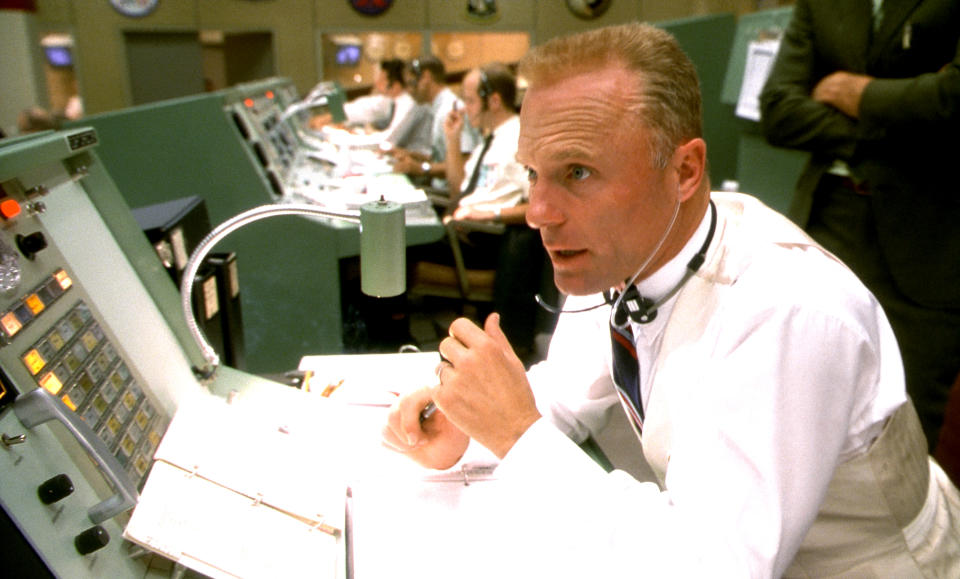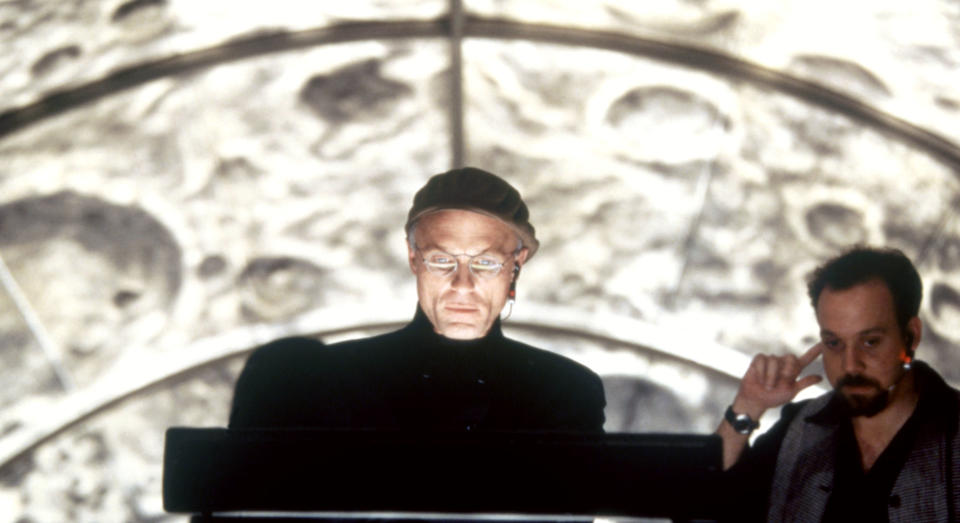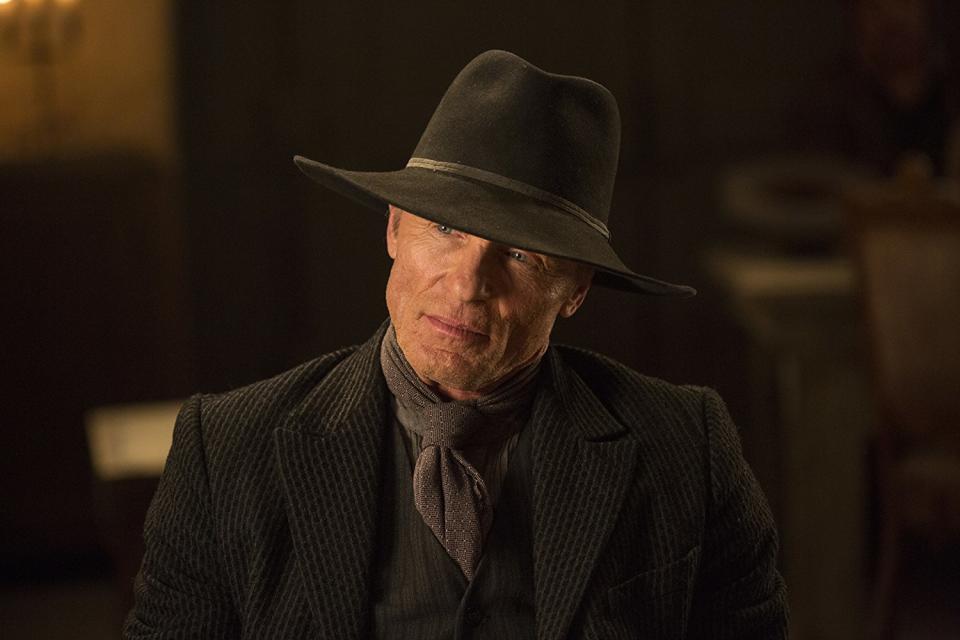Role Recall: Ed Harris on whether he really was in 'Field of Dreams,' how he smashed phones on the set of 'The Rock,' and why he's the hero on 'Westworld'
Beginning as a television actor in the mid-1970s, four-time Oscar nominee Ed Harris became the film star he is today after he landed the role of American icon John Glenn in 1983’s classic The Right Stuff. The astronaut action film launched Harris on a stellar career that is still going strong.
While mostly known for playing tough guys who don’t suffer fools, Harris has the ability to inhabit any role, from egomaniacal visionaries (The Truman Show), tortured artists (The Hours and Pollock), unassuming heroes (Apollo 13). But he is really good at playing black hats (The Rock, A History of Violence, Westworld).
In addition to his continuing role on HBO’s sci-fi series, Harris also appears as a dying photographer taking one last road trip with the son (Jason Sudeikis) he abandoned and the personal assistant he mistreats (Elizabeth Olsen) in Netflix’s new movie Kodachrome.
Although he might seem like a man of few words, Harris sat down with Yahoo Entertainment to share some surprisingly candid thoughts on his diverse decades-long career in movies and television.
The Right Stuff (1983)
Harris’s uncanny resemblance to John Glenn is what initially caught the attention of filmmaker Philip Kaufman and producer Robert Chartoff, but he ultimately scored his career-catapulting part with his acting chops. “It was the first major movie I had been in,” Harris tells us. “I had been in a few others, but it was very important to me.”
The timing of the release of The Right Stuff was one of note. Just as Kaufman’s movie was about to come out, then-Sen. John Glenn was gearing up for what would be an unsuccessful run for president.
“My face was on the cover of Newsweek back then, which my mother was very excited about, and I guess I was too,” Harris remembers. “And you know, God bless him, John … Sen. Glenn was probably running one of the historically most boring presidential campaigns in history, unfortunately. Didn’t pan out for him. During that time [Tom Wolffe’s] book kind of poked a lot of fun at Mr. Glenn and so the Glenn campaign wasn’t sure what the film was going to be like. So they didn’t want to even deal with it. … I had a lot of respect for him, for sure.”
Field of Dreams (1989)
IMDb has Harris listed as the uncredited voice Kevin Costner hears urging him to build a ball field, a rumor that has persisted for years. Even the author of the source material, W.P. Kinsella, wrote he was told Ed Harris was the “Voice.” After all, it wouldn’t have been the biggest stretch to imagine Harris’s wife and Field of Dreams star Amy Madigan arranging such a cameo. But Harris is officially bursting the bubble. “That is not true,” Harris says with a smile. “You can put that rumor to rest.”
The Abyss (1989)
A James Cameron sci-fi film that didn’t have the same impact has Terminator or Aliens, The Abyss is generally remembered for its production woes as much as it is for the final product. The movie was shot in millions of gallons of water in an abandoned nuclear power station, and at one point Harris came close to drowning.
“The first thing that comes to mind is the harrowing experience I had down 30 feet underwater, where I thought maybe I bought it there for a few seconds,” Harris reminisces. “That was such a tough shoot for all of us involved … all of us who worked on that, we had to hold on to each other because it was such an insane shoot.”
“I’m really proud of the movie — I remain disappointed in the ending of it because I think until the last 10 to 15 minutes of that film it’s really a good film. And then it kind of goes like, ‘What?’ But what are you going to do?”
Apollo 13 (1995)

Ron Howard’s Apollo 13 brought Harris back to the space race. This time instead of playing one of the men who blasts off, he played a man on the ground, NASA flight director Gene Kranz. While he never met the man he portrayed, Harris did deliver a (fictional) line so memorable that Kranz wound up using it for his memoir, Failure Is Not an Option. Harris also scored his first Oscar nomination for the role.
“It was very exciting for my mother and father,” Harris says when asked what that first Oscar nom meant to him. “I was excited about it. I’m not opposed to people appreciating my work.”
The Rock (1996)
It might seem impossible in a movie featuring Sean Connery and Nicolas Cage, but Harris legitimately steals scenes as the vengeful and deranged Brig. Gen. Frank Hummel. Footage from behind the scenes shows Harris’s legendary intensity, but he insists it was a “good time.”
“It was one of Michael Bay’s earliest movies, you know,” Harris tells us. “Michael and I got along fine, and David Morse was in there. We had a good bunch of people to work with. I had a couple of speeches in that thing that were kind of tough to do. I had to get myself rather worked up to do them, but I got there. I remember there was one scene, there was a telephone and I got very frustrated and I started banging the receiver down. Every time I was doing the scene, Bay would bring the phone over so if I had some angst to work out, I could smash it.”
The Truman Show (1998)
Harris was a late addition to the cast of The Truman Show. Playing a part originally intended for Dennis Hopper, Harris had little to no time to prepare for his role and never actually worked with Jim Carrey during the making of the movie.
“I met [director] Peter Weir on a beach in Malibu, I think on a Thursday,” Harris recalls. “And I started shooting on Tuesday. I was replacing another actor, and I had to go to New York that weekend for something and came back and jumped right into it. It was kind of good for me, because it didn’t give me any time to think about playing this God-like character. I might’ve tied myself up in knots trying to figure out something. I just had to commit to something.”

Pollock (2000)
Harris became fixated on capturing the intensity of Jackson Pollock, spending the better part of 10 years on what would become his directorial debut. Harris sparked to the idea after his father mailed him a book about Pollock, something the actor took as a warning about his heavy drinking.
“I really did work on that thing for almost a decade, in terms of the script, getting the rights, starting to paint, etcetera etcetera,” Harris explains. “My thought was not to direct it until about a year before filming. I was so obsessed with it. I had talked to other directors about it. Ones who were interested had their own thoughts about it, and I was like, ‘Wait a minute. No, no, no. That’s not what’s in my head.’ So I decided to direct it myself and I figured I knew more about it than I thought I did. It was a learning experience, but I’m really proud of the movie. I’m glad it held up. It was a tough, tough, tough shoot — ended up spending a lot my own money on it, but I didn’t care.”
In an interview with Today, Harris hinted that his wife (and Pollock co-star) Madigan wasn’t happy with his on-set behavior.
“I had a lot going on, it was intense,” he reveals to us. “I’d lose my temper, maybe not be as polite as I could have been at times, and she hadn’t been around for the first few weeks of filming. Yeah, she was slightly appalled at my behavior, but what can I say?”
The Hours (2002)
Harris took a moment to consider the question when asked if he was surprised people considered this Oscar-nominated performance “against type.” “He was a gay man and a writer,” Harris replies. “To me, I like to feel that I’m not a typecast individual. I get to play different kinds of roles, and that was one of them.”
He lost a fair amount of weight to play Richard Brown, but Harris didn’t want fans to worry about his process. “It just took a little bit of discipline, you know?” he says. “I wasn’t eating very much. I was making sure I was staying healthy but I tried to get as lean as I could … my metabolism is pretty good, so it worked out.”
A History of Violence (2005)
Based on a graphic novel, this Viggo Mortensen-led, David Cronenberg-directed crime drama featured Harris as the scarred and menacing Carl Fogarty. “That one contact that was glazed over, I don’t think I could see out that worth a damn,” Harris shares.
Fogarty is dispatched with a shot to the back from Jack Stall (Ashton Holmes). Asked his memories from that day, Harris replies with a hearty laugh, “I remember being in the yard being shot.”
Westworld (2016-present)
Harris, who started his acting career on television in bit parts, says he probably wouldn’t have been very interested in being a television regular once his film roles became more plentiful. “If you had asked me 20 years ago I’d say, ‘Doubtful,'” Harris admits. “As we all know, the nature of things has changed a great deal.”

While Harris’s Man in Black was considered one of the show’s villains in Season 1 of Westworld, Harris thinks audiences will see him in a different light during the show’s sophomore effort.
“I did this Q&A … one of the questions was, ‘Do you see your character as a protagonist or antagonist?’ and I said, ‘A protagonist,'” Harris recounts. “I think particularly, it didn’t feel that way in the first season; I think maybe hopefully more in the second season. I think there’s something he’s trying to do in the second year that is worthy.”
And how much does Harris pay attention to all those intense Westworld theories circulating online? “Very little.”
Ed Harris’s new movie Kodachrome is now available for streaming on Netflix.
Watch Ed Harris discuss Jason Sudeikis’s dramatic performance in their new movie Kodachrome:
Read more from Yahoo Entertainment:


